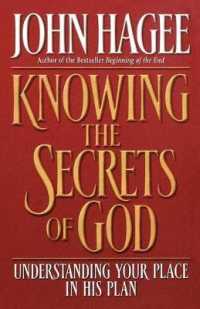- ホーム
- > 洋書
- > 英文書
- > Literary Criticism
Full Description
Hope for us has a positive connotation. Yet it was criticized in classical antiquity as a distraction from the present moment, as the occasion for irrational and self-destructive thinking, and as a presumption against the gods. To what extent do arguments against hope today remain useful? If hope sounds to us like a good thing, that reaction stems from a progressive political tradition grounded in the French Revolution, aspects of Romantic literature and the influence of the Abrahamic faiths. Ranging both wide and deep, Adam Potkay examines the cases for and against hope found in literature from antiquity to the present. Drawing imaginatively on several fields and creatively juxtaposing poetry, drama, and novels alongside philosophy, theology and political theory, the author brings continually fresh insights to a subject of perennial interest. This is a bold and illuminating new treatment of a long-running literary debate as complex as it is compelling.
Contents
Introduction: For and against hope; 1. The limits of hope in the ancient world; 2. Eternal hope: The Christian vision; 3. The three hopes of humanism: Sacred, profane, and political; 4. Something evermore about to be: Hope in the Romantic era; 5. Later nineteenth-century responses to Romantic hope; 6. Modernism: Repetition, epiphany, waiting.








